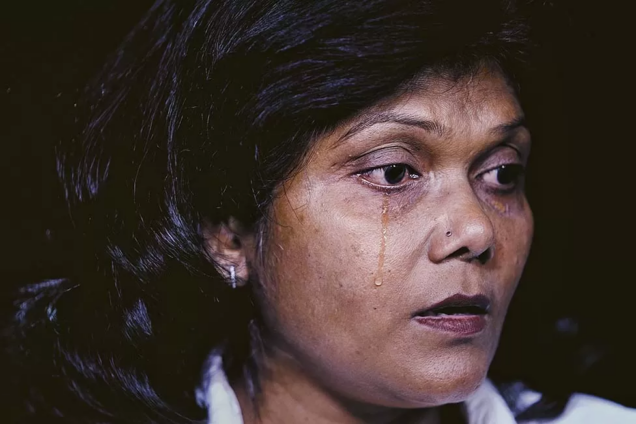A blackmail scam is using instant loan apps to entrap and humiliate people across India and other countries in Asia, Africa, and Latin America.
At least 60 Indians have killed themselves after being abused and threatened. A BBC undercover investigation has exposed those profiting from this deadly scam in India and China.
Astha Sinhaa woke up to her aunt's panicked voice on the phone. "Don't let your mother leave the house."
Half-asleep, the 17-year-old was terrified to find her mum Bhoomi Sinhaa in the next room, sobbing and frantic.
Here was her funny and fearless mother, a respected Mumbai-based property lawyer, a widow raising her daughter alone, reduced to a frenzied mess.
"She was breaking apart," Astha says. A panicked Bhoomi started telling her where all the important documents and contacts were and seemed desperate to get out of the door.
Astha knew she had to stop her. "Don't let her out of your sight," her aunt had told her. "Because she will end her life."
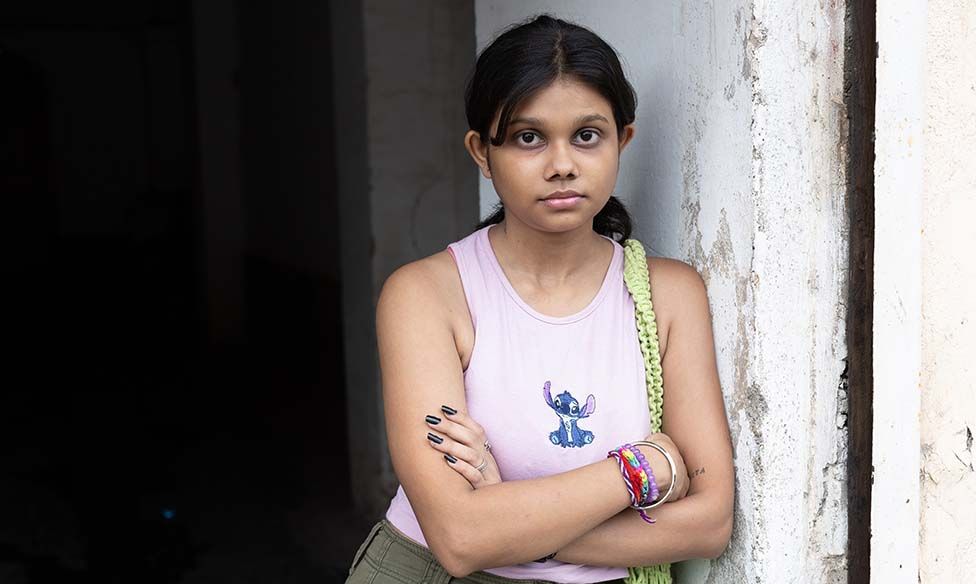
PRARTHNA SINGH/BBC
Astha knew her mother had been getting some weird calls and that she owed somebody money, but she had no idea that Bhoomi was reeling from months of harassment and psychological torture.
She had fallen victim to a global scam with tentacles in at least 14 countries that uses shame and blackmail to make a profit - destroying lives in the process.
The business model is brutal but simple.
There are many apps that promise hassle-free loans in minutes. Not all of them are predatory. But many - once downloaded - harvest your contacts, photos and ID cards, and use that information later to extort you.
When customers don't repay on time - and sometimes even when they do - they share this information with a call centre where young agents of the gig economy, armed with laptops and phones are trained to harass and humiliate people into repayment.
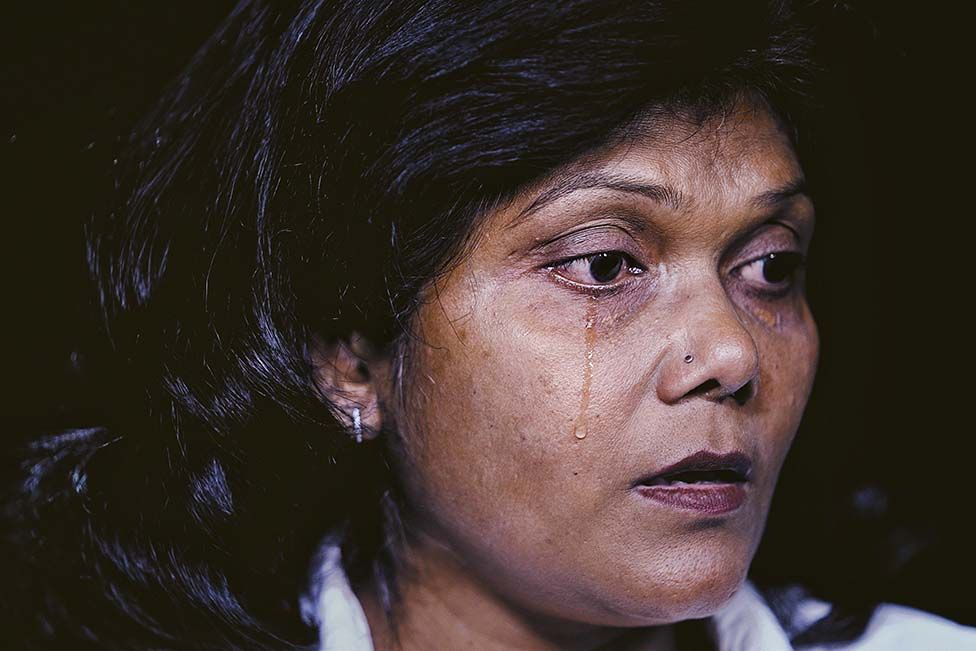
At the end of 2021, Bhoomi had borrowed about 47,000 rupees ($565; £463) from several loan apps while she waited for some work expenses to come through. The money arrived almost immediately but with a big chunk deducted in charges.
Seven days later she was due to repay but her expenses still hadn't been paid, so she borrowed from another app and then another. The debt and interest spiralled until she owed about two million rupees ($24,000; £19,655).
Soon the recovery agents started calling. They quickly turned nasty, slamming Bhoomi with insults and abuse. Even when she had paid, they claimed she was lying. They called up to 200 times a day. They knew where she lived, they said and sent her pictures of a dead body as a warning.
As the abuse escalated they threatened to message all of the 486 contacts in her phone telling them she was a thief and a whore. When they threatened to tarnish her daughter's reputation too, Bhoomi could no longer sleep.
She borrowed from friends, family and more and more apps - 69 in total. At night, she prayed the morning would never come. But without fail at 07:00, her phone would start pinging and buzzing incessantly.
Eventually, Bhoomi had managed to pay back all of the money, but one app in particular - Asan Loan - wouldn't stop calling. Exhausted, she couldn't concentrate at work and started having panic attacks.
One day a colleague called her over to his desk and showed her something on his phone - a naked, pornographic picture of her.
The photo had been crudely photoshopped, Bhoomi's head stuck on someone else's body, but it filled her with disgust and shame. She collapsed by her colleague's desk. It had been sent by Asan Loan to every contact in her phone book. That was when Bhoomi thought of killing herself.
We've seen evidence of scams like this run by various companies all over the world. But in India alone, the BBC has found at least 60 people have killed themselves after being harassed by loan apps.
Most were in their 20s and 30s - a fireman, an award-winning musician, a young mum and dad leaving behind their three- and five-year-old daughters, a grandfather and grandson who got involved in loan apps together. Four were just teenagers.
Most victims are too ashamed to speak about the scam, and the perpetrators have remained, for the most part, anonymous and invisible. After looking for an insider for months, the BBC managed to track down a young man who had worked as a debt recovery agent for call centres working for multiple loan apps.
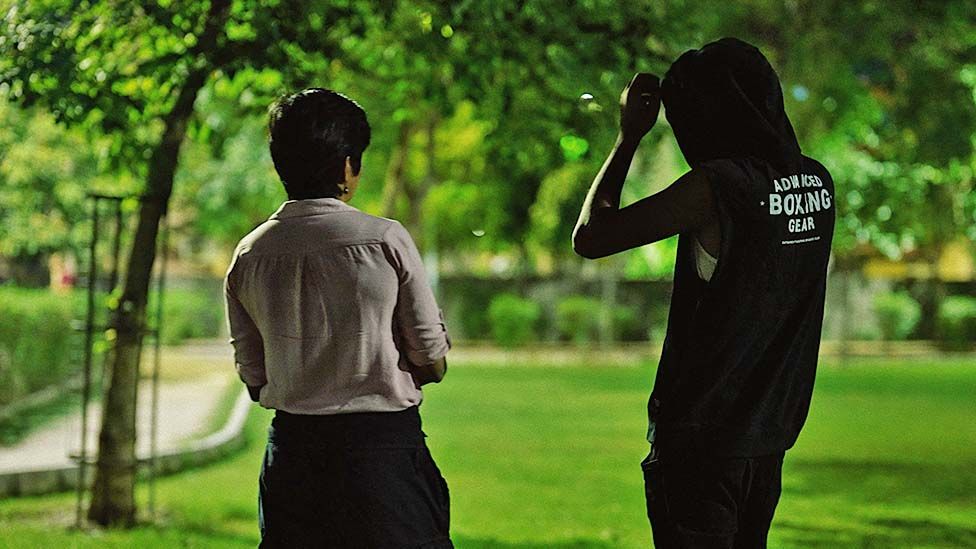
Rohan - not his real name - told us he had been troubled by the abuse he had witnessed. Many customers cried, some threatened to kill themselves, he said. "It would haunt me all night." He agreed to help the BBC expose the scam.
He applied for a job in two different call centres - Majesty Legal Services and Callflex Corporation - and spent weeks filming undercover.
His videos captured young agents harassing clients. "Behave or I will smash you," one woman says, swearing. She accuses the customer of incest and, when he hangs up, she starts laughing. Another suggests the client should prostitute his mother to repay the loan.
Rohan recorded over 100 incidents of harassment and abuse, capturing this systematic extortion on camera for the first time.
The worst abuse he witnessed took place at Callflex Corporation, just outside Delhi. Here, agents routinely used obscene language to humiliate and threaten customers. These were not rogue agents going off-script - they were supervised and directed by managers at the call centre, including one called Vishal Chaurasia.
Rohan gained Chaurasia's trust, and together with a journalist posing as an investor, arranged a meeting at which they asked him to explain exactly how the scam works.
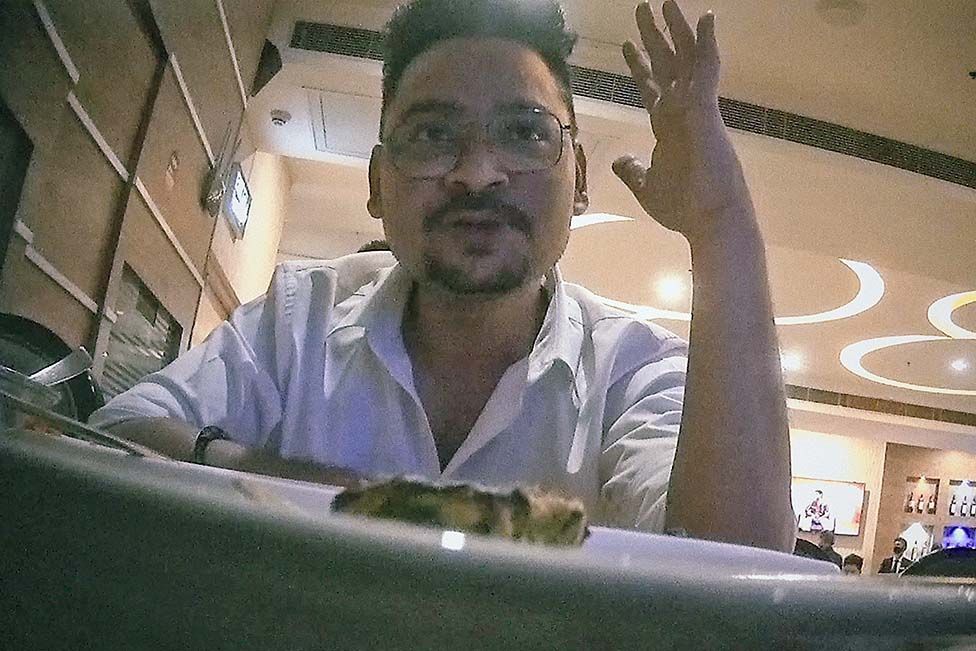
When a customer takes out a loan, he explained, they give the app access to the contacts on their phone. Callflex Corporation is hired to recover the money - and if the customer misses a payment the company starts hassling them, and then their contacts. His staff can say anything, Chaurasia told them, as long as they get a repayment.
"The customer then pays because of the shame," he said. "You'll find at least one person in his contact list who can destroy his life."
We approached Chaurasia directly but he did not want to comment. Callflex Corporation did not respond to our efforts to contact them.
One of the many lives destroyed was Kirni Mounika's.
The 24-year-old civil servant was the brains of her family, the only student at her school to get a government job, a doting sister to her three brothers. Her father, a successful farmer, was ready to support her to do a masters in Australia.
The Monday she took her own life, three years ago, she had hopped on her scooter to go to work as usual.
"She was all smiles," her father, Kirni Bhoopani, says.
It was only when police reviewed Mounika's phone and bank statements that they found out she had borrowed from 55 different loan apps. It started with a loan of 10,000 rupees ($120; £100) and spiralled to more than 30 times that. By the time she decided to kill herself, she had paid back more than 300,000 rupees ($3,600; £2,960).
Police say the apps harassed her with calls and vulgar messages - and had started messaging her contacts.
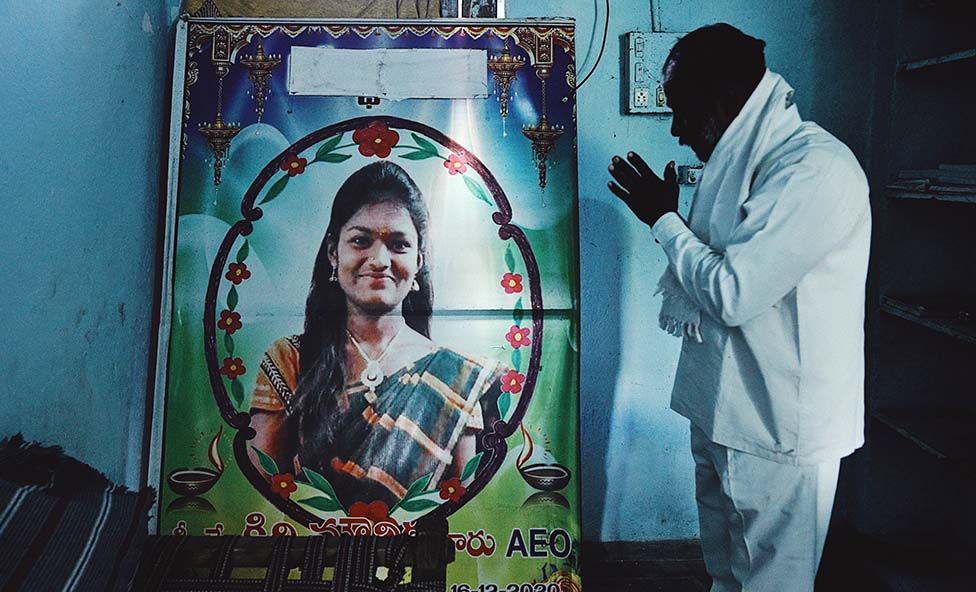
Mounika's room is now a makeshift shrine. Her government ID card hangs by the door, the bag her mum packed for a wedding still lying there.
The thing that upsets her father the most is that she hadn't told him what was going on. "We could have easily arranged the money," he says, wiping tears from his eyes.
He's furious at the people who did this.
As he was taking his daughter's body home from the hospital her phone rang and he answered to an obscenity-laden rant. "They told us she has to pay," he says. "We told them she was dead."
He wondered who these monsters could be.
Hari - not his real name - worked at a call centre doing recovery for one of the apps Mounika had borrowed from. The pay was good but by the time Mounika died he was already feeling uneasy about what he was part of.
Although he claims not to have made abusive calls himself - he says he was in the team that made initial polite calls - he told us managers instructed staff to abuse and threaten people.
The agents would send messages to a victim's contacts, painting the victim as a fraud and a thief.
"Everyone has a reputation to maintain in front of their family. No one is going to spoil that reputation for the measly sum of 5,000 rupees," he says.
Once a payment had been made the system would ping "Success!" and they would move on to the next client.
When clients started threatening to take their own lives nobody took it seriously - then the suicides started happening. The staff called their boss, Parshuram Takve, to ask if they should stop.
The following day Takve appeared in the office. He was angry. "He said, 'Do what you're told and make recoveries,'" Hari says. So they did.
A few months later, Mounika was dead.
Takve was ruthless. But he wasn't running this operation alone. Sometimes, Hari says, the software interface would switch to Chinese without warning.
Takve was married to a Chinese woman called Liang Tian Tian. Together, they had set up the loan recovery business, Jiyaliang, in Pune, where Hari worked.
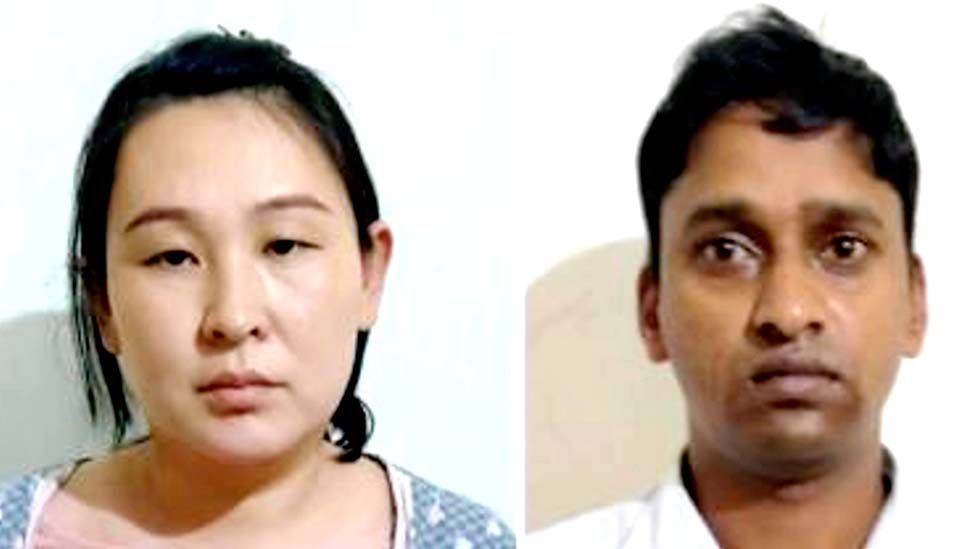
In December 2020, Takve and Liang were arrested by police investigating a case of harassment and released on bail a few months later.
In April 2022 they were charged with extortion, intimidation and abetment of suicide. By the end of the year, they were on the run.
We couldn't track down Takve. But when we investigated the apps Jiyaliang worked for, it led us to a Chinese businessman called Li Xiang.
He has no online presence, but we found a phone number linked to one of his employees and, posing as investors, set up a meeting with Li.
With his face shoved uncomfortably close to the camera, he bragged about his businesses in India.
"We are still operating now, just not letting Indians know we are a Chinese company," he said.
Back in 2021, two of Li's companies had been raided by Indian police investigating harassment by loan apps. Their bank accounts had been frozen.

"You need to understand that because we aim to recover our investment quickly, we certainly don't pay local taxes, and the interest rates we offer violate local laws," he says.
Li told us his company has its own loan apps in India, Mexico and Colombia. He claimed to be an industry leader in risk control and debt collection services in South East Asia, and is now expanding across Latin America and Africa - with more than 3,000 staff in Pakistan, Bangladesh and India ready to provide "post-loan services".
Then he explained what his company does to recover loans.
"If you don't repay, we may add you on WhatsApp, and on the third day, we will call and message you on WhatsApp at the same time, and call your contacts. Then, on the fourth day, if your contacts don't pay, we have specific detailed procedures.
"We access his call records and capture a lot of his information. Basically, it's like he's naked in front of us."
Bhoomi Sinha could handle the harassment, the threats, the abuse and the exhaustion - but not the shame of being linked to that pornographic image.
"That message actually stripped me naked in front of the entire world," she says. "I lost my self-respect, my morality, my dignity, everything in a second."
It was shared with lawyers, architects, government officials, elderly relatives and friends of her parents - people who would never look at her in the same way again.
"It has tarnished the core of me, like if you join a broken glass, there will still be cracks on it," she says.
She has been ostracised by neighbours in the community she has lived in for 40 years.
"As of today, I have no friends. It's just me I guess," she says with a sad chuckle.
Some of her family still don't speak to her. And she constantly wonders whether the men she works with are picturing her naked.
The morning that her daughter Astha found her she was at her lowest ebb. But it was also the moment she decided to fight back. "I don't want to die like this," she decided.
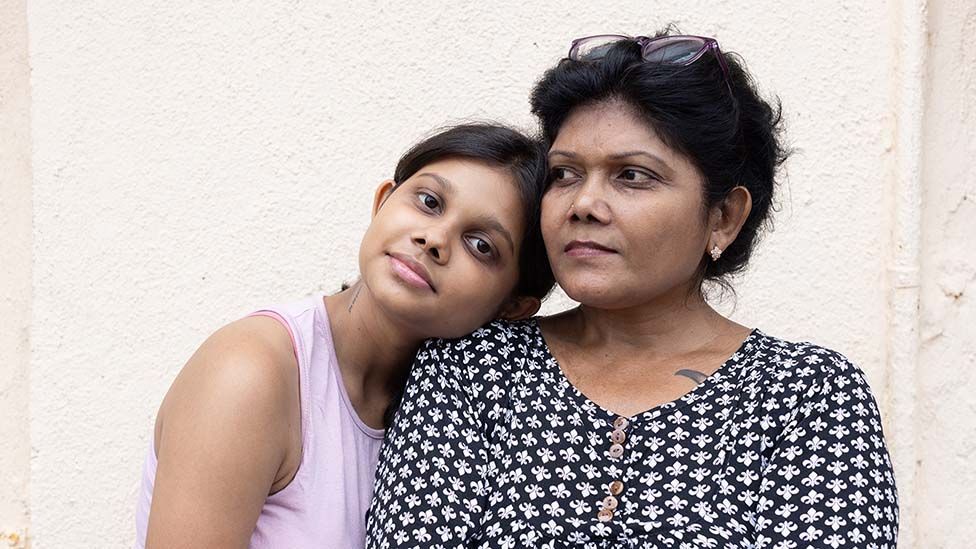
PRARTHNA SINGH/BBC
She filed a police report but has heard nothing since. All she could do was change her number and get rid of her sim card - and when Astha started receiving calls her daughter destroyed hers too. She told friends, family and colleagues to ignore the calls and messages and, eventually, they all but stopped.
Bhoomi found support in her sisters, her boss and an online community of others abused by loan apps. But mostly, she found strength in her daughter.
"I must have done something good to be given a daughter like this," she says. "If she hadn't stood by me then I would have been one of the many people who've killed themselves because of loan apps."
We put the allegations in this report to Asan Loan - and also, through contacts, to Liang Tian Tian and Parshuram Takve, who are in hiding. Neither the company nor the couple responded.
When asked for comment, Li Xiang told the BBC that he and his companies comply with all local laws and regulations, have never run predatory loan apps, have ceased collaboration with Jiyaliang, the loan recovery company run by Liang Tian Tian and Parshuram Takve, and do not collect or use customers' contact information.
He said his loan recovery call centres adhere to strict standards and he denied profiting from the suffering of ordinary Indians.
Majesty Legal Services deny using customers' contacts to recover loans. They told us their agents are instructed to avoid abusive or threatening calls, and any violation of the company's policies results in dismissal.
Latest Stories
-
Expansion Drive: Takoradi Technical University increases faculties
3 hours -
SHS heads demand payment of outstanding funds before reopening of schools
4 hours -
We thank God for the 2024 general elections – Akufo-Addo
4 hours -
Coconut Grove Beach Resort marks 30 years of excellence with memorable 9 lessons & carols service
4 hours -
WAFU B U-17 Girls’ Cup: Black Maidens beat Nigeria on penalties to win inaugral tournament
5 hours -
Real Madrid beat Sevilla to keep pressure on leaders Atletico
6 hours -
Liverpool put six past Spurs to go four points clear
6 hours -
Manchester United lose 3-0 at home to Bournemouth yet again
6 hours -
CHAN 2024Q: ‘It’s still an open game’ – Didi on Ghana’s draw with Nigeria
6 hours -
CHAN 2024Q: Ghana’s Black Galaxies held by Nigeria in first-leg tie
7 hours -
Dr Nduom hopeful defunct GN bank will be restored under Mahama administration
8 hours -
Bridget Bonnie celebrates NDC Victory, champions hope for women and youth
8 hours -
Shamima Muslim urges youth to lead Ghana’s renewal at 18Plus4NDC anniversary
9 hours -
Akufo-Addo condemns post-election violence, blames NDC
9 hours -
DAMC, Free Food Company, to distribute 10,000 packs of food to street kids
10 hours

